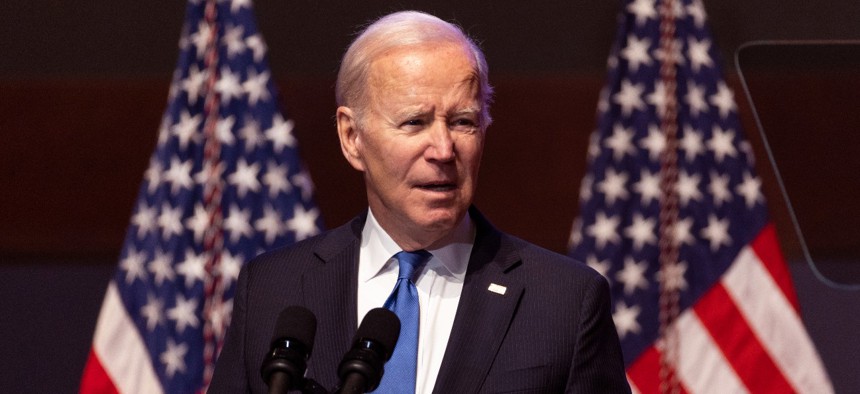
President Biden on Thursday asked agencies to expand their leave offerings. Kevin Dietsch/Getty Images
Biden Instructs Agencies to Expand Some Forms of Paid, Unpaid Leave for Feds
A memo to agency heads urges them to support federal workers who need to take paid or unpaid leave for a family matter or to escape from domestic violence and other dangerous situations.
President Biden on Thursday called on agencies to beef up their offerings of paid and unpaid leave for federal employees when they need to take time off for major life events.
Congress has acted multiple times in recent years to expand federal workers’ access to paid leave. In 2019, lawmakers passed legislation that, among other things, granted all federal employees up to 12 weeks per year in paid leave in connection with the birth or adoption of a child. And in 2021, they approved up to two weeks of paid bereavement leave following the death of a child.
“The United States is one of the few countries in the world that does not guarantee paid leave—and 92% of the nation’s lowest wage workers, who are disproportionately women and workers of color, lack access to paid family leave through their employer,” Biden wrote. “Lack of access to paid family and medical leave can risk the health, well-being and economic security of workers and their families.”
In a memo to agency heads, Biden urged them to beef up their leave offerings, particularly for federal employees who have recently entered public service and may not have had enough time to accrue paid leave or to qualify for leave under the Family and Medical Leave Act. The FMLA allows Americans to take up to 12 weeks of unpaid leave if they are seriously ill or to care for an ailing family member or a new child without risk of losing their jobs.
“Being a model employer includes updating our workplace policies and practices to reflect the emerging needs of our workforce today and tomorrow,” he wrote. “It also requires recognizing an employee’s important caregiving relationships with family members, including extended family and other individuals with equivalent relationships. In addition, federal employees need access to extended family and medical leave, particularly during their first year of federal service when they may not have accrued sufficient leave and are not yet eligible for leave under the Family and Medical Leave Act of 1993.”
Biden “encouraged” agencies to provide unpaid leave for federal workers to bond with a new child, care for themselves or a family member with a “serious health condition,” handle affairs when a family member in the military is called into active duty or bereavement following a family member’s death. The Office of Personnel Management and Office of Management and Budget are tasked with helping agencies achieve those goals, and agency heads must inform the White House Gender Policy Council of their progress implementing the reforms in one year.
Additionally, OPM Director Kiran Ahuja is responsible for developing recommendations on how federal agencies can provide “safe” leave, either paid or unpaid, to federal workers who need time off to escape and recover from domestic violence, dating violence, sexual assault or stalking.
According to the memo, the leave could cover time spent obtaining medical and mental health treatment, seeking assistance from nonprofits that support domestic violence and sexual assault survivors, moving or taking legal action. And federal workers would be able to take leave to help a family member undertake any of those steps.
NEXT STORY: All TSP Portfolios Started Strong in 2023







